De Schotse dichter William Drummond werd geboren op 13 december 1585 in Hawthornden, in de buurt van Edinburgh. Zie ook alle tags voor William Drummond op dit blog.
De Snowbird
O leetle bird dat’s come to us w’en stormy win’ she’s blowin’,
An’ ev’ry fiel’ an’ mountain top is cover wit’ de snow,
How far from home you’re flyin’, noboddy’s never knowin’
For spen’ wit’ us de winter tam, mon cher petit oiseau!
We alway know you’re comin’, w’en we hear de firs’ beeg storm,
A sweepin’ from de sky above, an’ screamin’ as she go–
Can tell you’re safe inside it, w’ere you’re keepin’ nice an’ warm,
But no wan’s never see you dere, mon cher petit oiseau!
Was it ‘way behin’ de mountain, dat de nort’ win’ ketch you sleepin’
Mebbe on your leetle nes’ too, an’ before de wing she grow,
Lif’ you up an’ bring you dat way, till some morning fin’ you peepin’
Out of new nes’ on de snow dreef, mon pauv’ petit oiseau!
All de wood is full on summer, wit’ de many bird is sing dere,
Dey mus’ offen know each oder, mebbe mak’ de frien’ also,
But w’en you was come on winter, never seein’ wan strange wing dere
Was it mak’ you feelin’ lonesome, mon pauv’ petit oiseau?
Plaintee bird is alway hidin’ on some place no wan can fin’ dem,
But ma leetle bird of winter, dat was not de way you go–
For de chil’ren on de roadside, you don’t seem to care for min’ dem
W’en dey pass on way to schoolhouse, mon cher petit oiseau!
No wan say you sing lak robin, but you got no tam for singin’
So busy it was keepin’ you get breakfas’ on de snow,
But de small note you was geev us, w’en it join de sleigh bell ringin’
Mak’ de true Canadian music, mon cher petit oiseau!
O de long an’ lonesome winter, if you’re never comin’ near us,
If we miss you on de roadside, an’ on all de place below!
But le bon Dieu he will sen’ you troo de storm again for cheer us,
W’en we mos’ was need you here too, mon cher petit oiseau!
William Drummond (13 december 1585 – 4 december 1649)
Drummond op het Scott Monument in Edinburgh
De Duitse dichter en schrijver Robert Gernhardt werd op 13 december 1937 in het Estische Reval (het huidige Tallinn) geboren. Zie ook alle tags voor Robert Gernhardt op dit blog.
Ach!
Ach, noch in der letzten Stunde
werde ich verbindlich sein.
Klopft der Tod an meine Türe,
ruf ich geschwind: Herein!
Woran soll es gehn? Ans Sterben?
Hab ich zwar noch nie gemacht,
doch wir werd’n das Kind schon schaukeln —
na, das wäre ja gelacht!
Interessant so eine Sanduhr!
Ja, die halt ich gern mal fest.
Ach – und das ist Ihre Sense?
Und die gibt mir dann den Rest?
Wohin soll ich mich jetzt wenden?
Links? Von Ihnen aus gesehn?
Ach, von mir aus! Bis zur Grube?
Und wie soll es weitergehn?
Ja, die Uhr ist abgelaufen.
Wollen Sie die jetzt zurück?
Gibts die irgendwo zu kaufen?
Ein so ausgefall’nes Stück
Findet man nicht alle Tage,
womit ich nur sagen will
— ach! Ich soll hier nichts mehr sagen?
Geht in Ordnung! Bin schon
Trost und Rat
Ja wer wird denn gleich verzweifeln,
weil er klein und laut und dumm ist?
Jedes Leben endet. Leb so,
daß du, wenn dein Leben um ist
von dir sagen kannst: Na wenn schon!
Ist mein Leben jetzt auch um,
habe ich doch was geleistet:
ich war klein u n d laut u n d dumm.
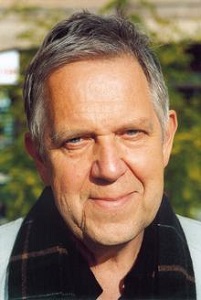
Robert Gernhardt (13 december 1937 – 30 juni 2006)
De Russische schrijver Jevgeni Petrov werd geboren in Odessa op 13 december 1903. Zie ook alle tags voor Jevgeni Petrov op dit blog.
Uit: The 12 Chairs
“It appeared that she had not. Nor had the galoshes been washed. Ippolit Matveyevich disliked his mother-in-law. Claudia Ivanovna was stupid, and her advanced age gave little hope of any improvement. She was stingy in the extreme, and it was only Ippolit Matveyevich’s poverty which prevented her giving rein to this passion. Her voice was so strong and fruity that it might well have been envied by Richard the Lionheart, at whose shout, as is well known, horses used to kneel. Furthermore, and this was the worst thing of all about her, she had dreams. She was always having dreams. She dreamed of girls in sashes, horses trimmed with the yellow braid worn by dragoons, caretakers playing harps, angels in watchmen’s fur coats who went for walks at night carrying clappers, and knitting-needles which hopped around the room by themselves making a distressing tinkle. An empty-headed woman was
Claudia Ivanovna. In addition to everything else, her upper lip was covered by a moustache, each side of which resembled a shaving brush.
Ippolit Matveyevich left the house in rather an irritable mood. Bezenchuk the undertaker was standing at the entrance to his tumble-down establishment, leaning against the door with his hands crossed. The regular collapse of his commercial undertakings plus a long period of practice in the consumption of intoxicating drinks had made his eyes bright yellow like a cat’s, and they burned with an unfading light.
“Greetings to an honoured guest!” he rattled off, seeing Vorobyaninov.
“Good mornin’.”
Ippolit Matveyevich politely raised his soiled beaver hat. “How’s your mother-in-law, might I inquire? ” “Mrr-mrr,” said Ippolit Matveyevich indistinctly, and shrugging his shoulders, continued on his way.
“God grant her health,” said Bezenchuk bitterly. “Nothin’ but losses, durn it.” And crossing his hands on his chest, he again leaned against the doorway.”
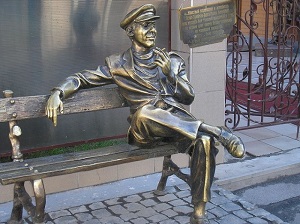
Jevgeni Petrov (13 december 1903 – 2 juli 1942)
Monument voor het romanperonage Ostap Bender in Kharkov
De Engelstalige en van oorsprong Zuid-Afrikaanse schrijver en officier Laurens Jan van der Post werd geboren in Philippopolis op 13 december 1906. Zie ook alle tags voor Laurens jan van der Post op dit blog.
Uit: The Seed and the Sower
“The truth is that from an early age most people found my looks disturbing and many of them were strongly attracted to me on account of my appearance. This again is one of those things I say without pride or humility, without vanity or self-satisfaction. I have long since come to the diamond point of the tumult within myself where facts alone, and nothing but the facts, accurately observed and truly interpreted, can move me. I know that only facts can save me and I long passionately to be able, from the facts of my being, to forge a weapon strong enough to enable me to fight back against the power and pomp of unreality which is marching so boastfully against both me and the spirit of my time. But over this matter of my appearance if I do recognize any other emotion in myself it is one of subtle and pervasive distaste. Perhaps this sounds ungrateful to life which has conferred such favours on me? Yet the truth remains. Part of me strongly resented my looks and blamed them too for what became of me. We had a neighbour who was born a dwarf and, as a child, whenever I saw him I used to pity him and feel grateful that I had not been given his shape. Yet today I am not sure that I should not have envied him. I simply do not know which constitutes the greatest danger to the integrity of being: to attract or to repel; to incur the dislikes or likes of one’s fellow men. The dwarf, after all, had only pity to fear and, men being what they are, that is never excessive. But I had their instant, magnetic liking for my enemy and before I knew where, or even who I was, I had become a prisoner of the effect I had on them. The dwarf was firmly shackled to his deformity. But I was shackled not so much to my good looks as to what people, after seeing me, first imagined and then through their imaginations compelled me to be. I know now that from my earliest age the effect that I had on those about me enticed me away from myself, drew me out of my own inner focus of being, and left me irrevocably committed to the role that my admirers and the obscure laws of their magnetic attraction automatically demanded of me. To this day I shiver at the recollection of the cold impersonal power and efficiency of the mechanisms of this compulsion, both in me and others, which forced me to lend my little measure of irreplaceable flesh and blood to the shadowy desires, phantom wishes and unlived selves of those around me. Slowly but surely I grew into a bitter estrangement from myself: a prodigal son in a far country of famished being, without any inkling of the dream that could have worked on my errant raw material. I suffered, as it were, from the curse of Helen whose face `launched a thousand ships and burnt the topless towers of Ilium’, that Helen whose image still haunts the eyes of men wherein she was held prisoner for so long.”
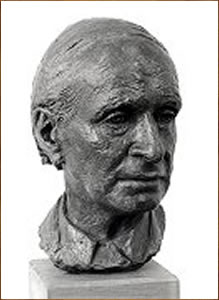
Laurens Jan van der Post (13 december 1906 – 16 december 1996)
Borstbeeld door Frances Baruch
De Canadeese schilderes en schrijfster Emily Carr werd geboren in Victoria op 13 december 1871Zie ook alle tags voor Emily Carr op dit blog.
Uit: The Book of Small
„Mother kissed us. Dede kissed us.
“Have you all got clean pocket handkerchiefs?”
Yes, we had.
“Don’t forget to use them.”
No, we wouldn’t.
“Be sure to thank Miss Langley for the nice time.”
“S’pose it isn’t nice?”
“Say ’thank you’ even more politely.”
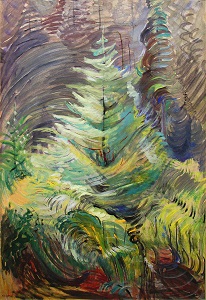
Emily Carr: Heart of the Forest
We sat in a row on the seat; Mr. Russell slammed the apron of the cab down in front of us, jumped up like a monkey to his perch at the back, and we were off–eight, six and four years old going to our first party.
It was such fun sitting there and being taken by the horse, just as if he knew all by himself where to find parties for little girls, for, after Mr. Russell had climbed up behind so that you could not see him, you forgot that there was a driver.”
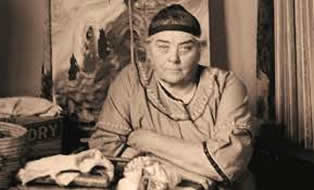
Emily Carr (13 december 1871 – 2 maart 1945)
